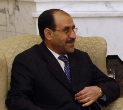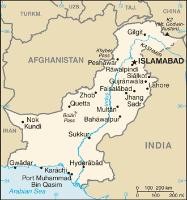Janine Davidson at Intel Dump cites a Tom Johnson and M. Chris Mason piece in the Atlantic, All Counterinsurgency is Local, before discussing the tension between the tactics of counterinsurgency, which emphasize engaging with governance and authority at the most immediate (ie. local) level, and the strategy of counterinsurgency, which emphasizes shoring up governance and authority at the national level: [T]he question we need to examine is about tradeoffs. What are we sacrificing from a national or international security perspective when we focus on human security at the local level, as Johnson and Mason suggest? What might an international system […]
Iraq Archive
Free Newsletter
Last Thursday, two agents of the German foreign intelligence service, the BND, who had been stationed in Baghdad during the Iraq War in 2003 testified before the intelligence oversight committee of the German Bundestag. The purpose of the hearing was to determine what exactly they were doing in Baghdad at the time and, above all, whether the information they reported back to BND headquarters in Pullach could in turn have been used by American military command. The latter possibility is regarded as controversial in Germany and has previously been reported as established fact by the New York Times. (The Times […]
John A. Nagl, 42, is a senior fellow at the Center for a New American Security. He is a retired Army lieutenant colonel, a veteran of both Operation Desert Storm and the current conflict in Iraq, and was one of the writers of the Army/Marine Corps Counterinsurgency Field Manual. He is also the author of “Learning to Eat Soup with a Knife,” published in 2005. In that book he uses archival sources and interviews to compare the development of counterinsurgency doctrine and practice in the 1948-1960 Malayan Emergency with the strategy used in the Vietnam War. Urs Gehriger of the […]
“For those like President Bush who profess certainty as to history’s purpose, using any means necessary to hurry history along to its predetermined destination offers a nearly irresistible temptation. When that conviction is accompanied by a further certainty that on the far side of victory permanent peace awaits, the resort to force becomes almost obligatory. The greater the sense of conviction the easier it becomes to justify any mayhem committed on behalf of big ideas.” –Andrew Bacevich, in a review of “The First Total War: Napoleon’s Europe and the Birth ofWarfare as We Know It,” by David A. Bell, in […]
Sometimes one man’s life can serve as a mirror to reflect the unfolding history of a nation. Keep a watch on the struggles of one Iraqi by the name of Mithal al-Alusi and you will see the drama of Iraq’s modern history and the battle for its future. Sometimes the reflected image emits a hopeful glow. Often, however, it shoots back like a dagger, causing a wince of pain. Alusi, who marches to the sound of his own idealistic beat, has a way of unsettling and angering Iraqis, even as he seeds the soil with new ideas. In recent weeks, […]
Buried at the end of this LAT article on Iraqi PM Nouri Maliki and the decline of American influence in Iraq is this passage: At the same time, Iraqi officials complain about the United States’ failure to create a lasting foundation beyond its military presence. Iran has created more than $2 billion in trade with its neighbor, including fuel and electricity exports. “The Iranians will stay in this place forever till the Judgment Day and the Americans will withdraw,” said Sheik Jalaluddin Saghir, a senior Shiite politician. “The Americans built their status on their military and their political viewpoints. They […]
To follow up a little bit on my post from Tuesday, it’s already obvious that “the Surge” has become a sort of political shorthand that means different things for different people. I was using it as shorthand for the political message it sent to the various Iraqi factions, namely that American forces would have to factored into the cost-benefit analysis of armed conflict so long as President Bush was in office. The problem of assigning causality, of course, is that the decision to increase troop strength in Baghdad didn’t happen in a vacuum, but rather in the aftermath of the […]

WASHINGTON — Among the gravest risks to the continuing improvement of the situation in Iraq is that Sunni militias now allied with the United States will not be successfully integrated into Iraqi Security Forces or find employment in the civilian economy, say Iraq analysts and U.S. government officials. But independent observers and U.S. officials differ sharply in their assessments of the possibility of a reversal in the Sunni “Awakening,” which is almost universally credited as a significant factor in recent reductions in violence. The Awakening movement began in earnest in 2006 in Iraq’s Anbar province, when U.S. commanders took advantage […]
It’s admittedly been a while since I wrote about Iraq, which is a testament to the ways in which that conflict has become a mature stabilization operation. Twenty-three U.S. soldiers dead in August is twenty-three too many. But the security gains since January 2007 are enormous and game-changing. I was opposed to the Surge when President Bush announced it, I’ve been skeptical of the weight it’s been given as a causal factor of the decline in violence, and I remain unconvinced that it has accomplished its ultimate strategic goal of ensuring that Iraq’s ethnic, sectarian and factional conflicts are resolved […]

Following years of promising gains since 2001, Afghanistan is in a tailspin. Not long ago, a sophisticated Taliban assault on a Kandahar prison freed 1,200 inmates, including 350 Taliban members. The attack came only weeks after Afghan President Hamid Karzai survived a fourth assassination attempt. The main forces behind the country’s downward spiral are al-Qaida and the Taliban, which have found sanctuary in the vast unpoliced region of western Pakistan known as the Federally Administered Tribal Areas (FATA). Stabilizing the Afghan-Pakistani front of the war on terrorism will require U.S. policymakers to re-examine the fatal misconception that they face only […]
